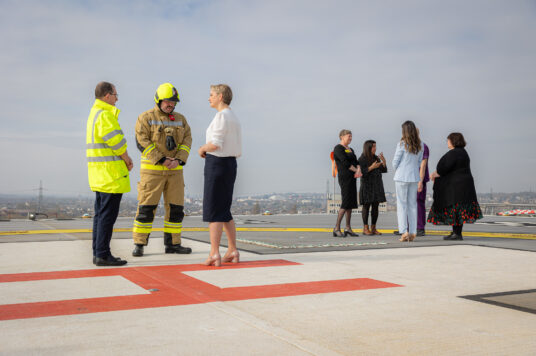Efforts to tackle knife crime set out in Home Secretary visit to St George’s
Home Secretary Yvette Cooper visited St George’s to hear how we’re tackling knife crime – with frontline staff laying bare the devastating impact violence has on our communities.
During the visit, which coincided with a Government announcement to ban ninja swords, the Home Secretary met with teams on our Major Trauma Ward, where she heard about the specialist care we provide as one of London’s four major trauma centres.
She also saw our knife amnesty bin – the first at any hospital in the UK – where a cache of dangerous weapons were revealed when the container was opened.
The secure bin, provided by knife crime charity Word 4 Weapons, is used to anonymously dispose of knives, and had amassed nearly 50 weapons in just three months.
Jacqueline Totterdell, Group Chief Executive of St George’s, Epsom and St Helier University Hospitals and Health Group, led the Home Secretary’s tour – which also included a visit to our helipad and a sit-down with some of our staff who treat knife crime victims.
She said: “Prevention is key when it comes to tackling knife crime, and we’re working with partners to keep weapons out of our hospitals and to support patients who have experienced violence.
“That’s on top of the life-saving care we provide to victims, from the treatment they receive when they first arrive in hospital, to the psychological support and therapy they’re offered further down the line. Thank you to the Home Secretary for taking the time to hear about our work, and the impact of knife crime on our communities.”
Last year, more than 500 people with injuries from knives and other sharp objects were treated at our emergency department – almost double that in 2022.
Becky Bryan, a Major Trauma Nurse Practitioner, who spoke to the Home Secretary during the visit, said: “The physical and psychological long-term effects of knife crime can be life-changing – losing independence and developing post-traumatic stress disorder can impact everything from work to family life.
“We’re fortunate to have psychologists offering ongoing support, but unfortunately, we sometimes see patients returning or their siblings and friends becoming victims.
“I see the knife bin on-site at St George’s as a really positive addition – it’s helping to take weapons off the streets and save lives. It gives people a chance to break the cycle of violence without fear of prosecution.”
The Government’s ninja ban forms part of Ronan’s Law, which aims to tackle the online sale of knives.
The law, which will also require online retailers to report any bulk or suspicious-looking purchases of knives to the police, is named after 16-year-old Ronan Kanda, who was murdered close to his home in Wolverhampton after being stabbed in the back and chest in a case of mistaken identity. His mum, Pooja, joined the tour of St George’s.
Home Secretary Yvette Cooper said: “Ronan Kanda was just 16 when he was ruthlessly killed by two boys only a year older than him. Today we are introducing the final part of Ronan’s law in his memory – banning the ninja swords that his killers should never have been able to use.
“We are acting with urgency to bring forward measures to prevent deadly weapons from getting into the wrong hands and will continue to do whatever is needed to prevent young people being killed on our streets as part of our mission to halve knife crime over the next decade.”


